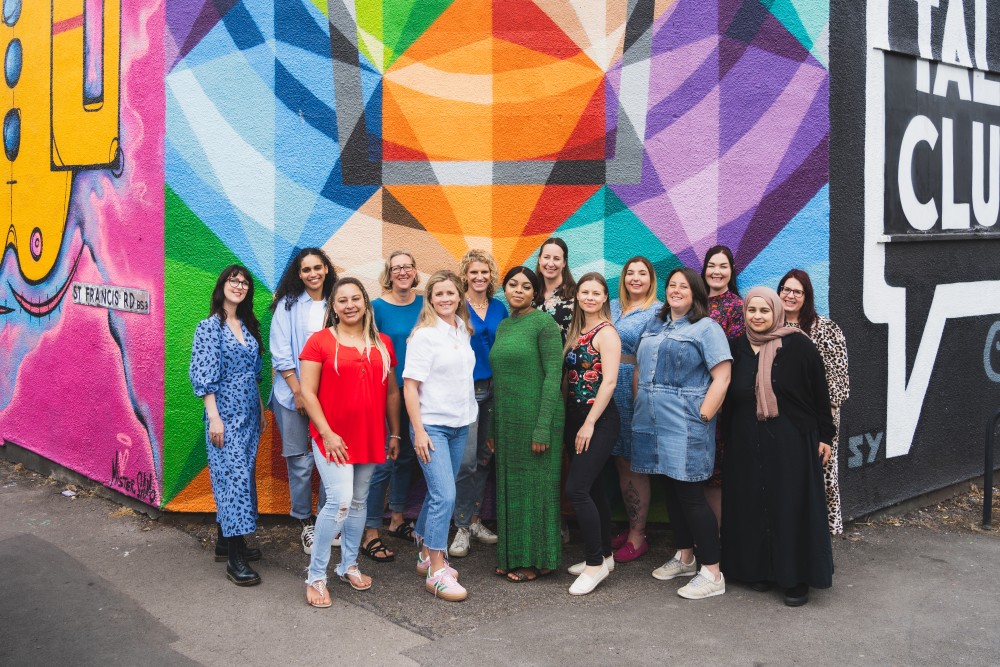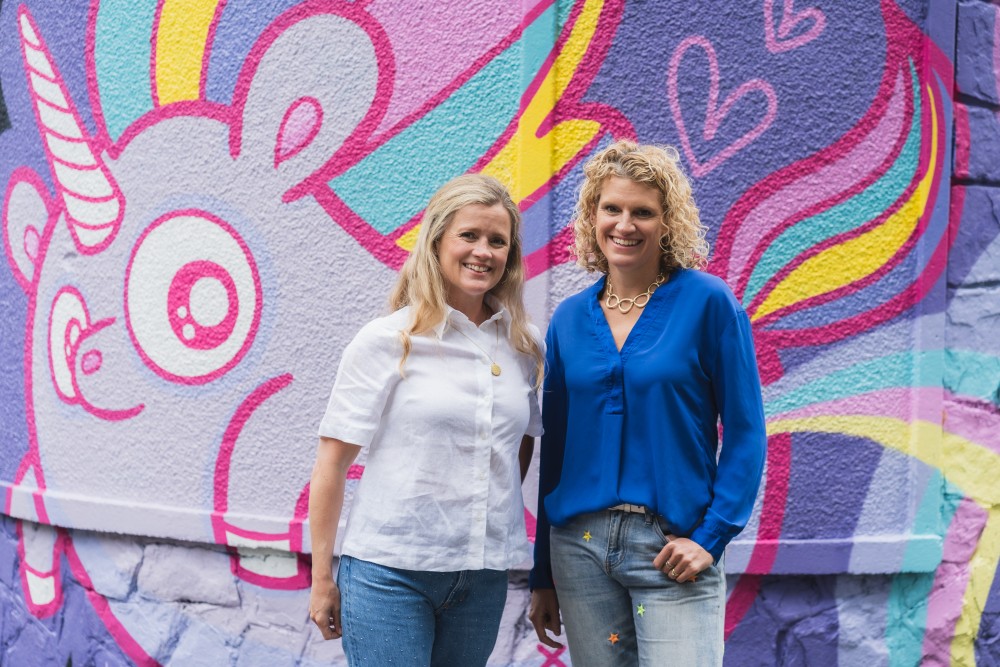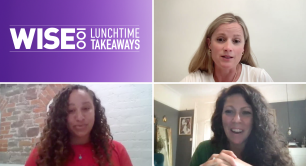Good Ideas: Why the co-CEOs of Women’s Work Lab don’t want their jobs
Cambridge Social Innovation Prizewinners Camilla Rigby and Rachel Mostyn, founders of Women’s Work Lab, say they want to build a team of women they’ve supported into work so strong they can hand the organisation over to its community.
The founders and co-CEOs of Women’s Work Lab, a social enterprise which has supported more than 500 unemployed mums on benefits back into work via a training, work placement and coaching programme, don’t want their jobs.
Which isn’t to say they don’t love their work. But, as Rachel explains, the co-CEOs want to embody the ethos that the social enterprise isn’t their personal fiefdom, rather they are stewards serving the community of mums they support.
To this end, Women’s Work Lab, which is based in Bristol, south west England, has a target of at least 30% of its workforce being graduates from their programmes. In fact, they are exceeding that target and the current figure is more like 50%.

Rachel says: “A real ambition for Camilla and me is that one day we may well be out of a job, because we have created a team that is just so awesome, and they’re doing such a good job. It doesn’t belong to us, it belongs to the community.”
Perhaps unsurprisingly for the leaders of an organisation focussed on women in work, Camilla and Rachel think very carefully about their roles as co-CEOs, to the point where Camilla likens the relationship to a marriage.
Which is why over the last year they’ve invested some of the £10,000 they won from the 2024 Cambridge Social Innovation Prize into coaching sessions to ensure they fully understand each other’s motivations and ways of working.
This is the only prize that I know of that enables founders to invest in themselves, which therefore means we can invest in the future of Women’s Work Lab
Camilla says: “It was just invaluable in terms of the co-founder relationship and for both of us to really understand how we both individually operate and what our motivations are. We both recognised that entering this next stage of growth, it was really important that we were aligned and together and still working in the way that we want to work.”
The emphasis of the Cambridge Social Innovation Prize on the personal and professional development of founders gave the Women’s Work Lab co-CEOs licence to invest in themselves, said Rachel.
She says: “Like all social enterprises, we’re constantly looking at how we can make more impact. And that will, generally speaking, be ‘we could put a new programme here, we could make a new hire there’. This is the only prize that I know of that enables founders to invest in themselves, which therefore means we can invest in the future of Women’s Work Lab.”
|
The Cambridge Social Innovation Prize The Cambridge Social Innovation Prize celebrates social impact through business across the UK. It is a prize for mid-career social innovators. Rather than targeting the rising stars or presenting lifetime achievement awards, it recognises those with potential to grow their impact who could use support to get to the next level. It is delivered by Trinity Hall and the Cambridge Centre for Social Innovation. Winners of the Cambridge Social Innovation Prize are selected for their achievements and potential in creating positive social impact for individuals and communities in different parts of the UK. These awards are made annually to extraordinary founder-CEOs of scale up social enterprises to support their growth as leaders. The Cambridge Social Innovation Prize includes a £10,000 cash award for personal and professional development. Additionally, mentoring from experts from Cambridge Social Ventures at Cambridge Judge Business School and support from an expanding community of social innovators at Trinity Hall help the winners to develop the skills, resources and networks they need to create more impact.
|
The failings of the UK benefits system
Camilla and Rachel founded Women’s Work Lab in 2019, in response to an awareness of the barriers mums on benefits face when trying to find work, which include lack of confidence, a lack of recent work experience and childcare difficulties.
Women’s Work Lab’s first programmes were delivered in Bristol, although the social enterprise has now expanded to other parts of south west England. The programme is one-year long and delivered entirely within school hours, to make it accessible for as many mums as possible.
The social enterprise has a strong track record of supporting mums into suitable jobs – in 2023, 71% of the women who graduated from Women’s Work Lab’s core programme were in employment, volunteering or further training within six months. But Camilla and Rachel also work to lobby government to better support for women seeking work, because they say the current benefits system doesn’t match the problems it is trying to solve.
Camilla says the benefits system has been simplified over the past ten years to the point where there isn’t enough nuance or understanding of complex, intersectional barriers women face in securing work. She says an overarching focus on mental health is preventing the acknowledgment of other barriers, for example the housing crisis.

To illustrate the point, Camilla tells the story of a woman who graduated from the Women’s Work Lab programme and lives in temporary housing. When she was offered a job she was told by a housing officer that if she accepted it, she would immediately have to pay her landlord the full rent until a decision was made on her future housing benefits.
Because she couldn’t put the home in which she and her children lived at risk, the woman was unable to take the job she had been offered. This is one example of many, says Camilla, but the system is unable to register the complexities of the situation.
She says: “What often happens is that she will go to the Jobcentre, and there isn't a box that her job coach can tick to fully explain what’s happening, but she will say, ‘I’m so stressed, I feel like I don’t know what to do. My anxiety is through the roof. My mental health has just got mad because of everything that’s going on’. And the box that they do tick is ‘mental health’, and so that's why she’s not working.”
Sustainability and expansion
When Rachel and Camilla founded Women’s Work Lab, they felt the barriers mums face in getting into work were a societal issue which both government and local businesses should contribute to solving.
Now, they partner with hundreds of local businesses to support the work placement element of their programme and they estimate around 75% of their funding comes from government contracts.
Having established a sustainable business in the south west of England, Camilla and Rachel now aim to expand Women’s Work Lab to Birmingham. They also want to introduce a course for women not yet ready to begin looking for work, which could provide a stepping stone towards Women’s Work Lab’s core programme.
It’s about supporting the whole household, not just the mums
Rachel explains: “It’s about supporting the whole household, not just the mums, because we meet mums all the time that have, for example, severely disabled children, so they’re not going to be going back to work in the next five years, because it’s just not an option for them. But they still want to build, they need to develop confidence and resilience. They need to look at all their transferable skills.”
Both Camilla and Rachel say they love going into ‘start-up mode’ as they prepare to launch new programmes or in a new area. But that excitement is tempered by the knowledge that the reason they are able to make plans to expand is because “the demand is massive”.
In Birmingham Camilla and Rachel plan to make some initial hires to get Women’s Work Lab up and running, before making space “very quickly” for opportunities for the women they’ve supported to join the team. Because, as Camilla says: “That’s the magic.”
This content is brought to you by Pioneers Post in partnership with the Cambridge Social Innovation Prize, a collaboration between Cambridge Centre for Social Innovation and Trinity Hall.

|
|





